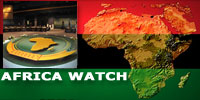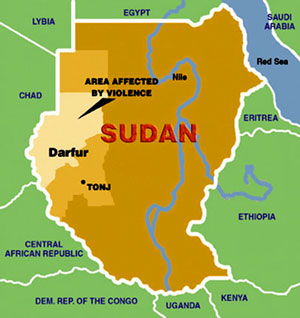Scarce water the root cause of Darfur conflict?
By Jehron Muhammad | Last updated: Mar 9, 2010 - 4:58:03 PMWhat's your opinion on this article?

|
Taking a closer look at this position suggests, “the crises in Darfur stems in part from disputes over water.”

‘According to a report dating back to 1999 and sponsored by the UN Development Program, fighting over limited resources as the scarcity of water, over the next 25 years, will possibly be the leading reason for major conflicts in Africa, not oil.’ |
This has also been confirmed by the United Nations.
In fact, according to a report dating back to 1999 and sponsored by the UN Development Program, fighting over limited resources as the scarcity of water, over the next 25 years, will possibly be the leading reason for major conflicts in Africa, not oil.
But this data is never shared and CFR's initial position is never expounded upon. What they then claim as actually at the root of the problem is: “... the Muslim government in the north ... engaged in a civil war with rebels in the Christian/animist south. The Sudanese government funded Darfur Arab militias—which came to be known as the ‘Janjaweed'...”
And this is par for the course and follows most of what has been written. Not that there weren't other extenuating circumstances that gave rise to conflict, including rebels crossing the border from Chad, and the distribution of weapons and the opening up of an illegal economy. But to focus solely on the Muslim and Arab north—when Darfur is nearly 100 percent Muslim—being engaged in genocide against the Black population of Darfur is suspect.
So its fair to say the majority of what has been written about the root cause of the conflict in Darfur is the government funded Janjaweed involved in a civil war with rebels, which escalated to include genocide against ethnic groups that inhabit the region. The resulting conflict due to draught, or a crisis brought on by depreciating water resources and the scarcity of arable land and its ramifications have received little or no ink.
Dr. Farouk El-Baz, director of the Center for Remote Sensing at Boston University, confirmed too or that, “water is the (root) cause of the problem in Darfur.” Unlike the Council On Foreign Relations, Dr. El-Baz, who was born in Egypt, chooses to expound on the limited water resources revealing, during an exclusive interview from his office on the campus of Boston University, that the reason for the conflict is the region's two “kinds of population(s).” One, he said is “sedentary farmers that (grow food and) raise cattle and therefore they congregate” around water sources and the other a “nomadic population” that depends on their ability as they travel to have access to available water sources.
The other population, he said, is a “nomadic population.” And these nomadic people, according to Dr. El-Baz, “usually depend on the fact that there are lots of wells in many directions or in several regions where they have access.”
This is confirmed in Modern and Mobile, a new book that highlights the conflict between pastoralists and farmers and published by the International Institute for Environment and Development (IIED).
Not only are restrictions on mobility caused by the corralling of limited water resources, says Dr. El-Baz. “Moving,” according to the Modern and Mobile's authors, but the issue “is now becoming a serious problem.” The authors wrote, “Access to water and markets is increasingly difficult and the profitability of livestock-keeping is being critically undermined. Poverty, resources degradation and conflict are increasing.”
In addition to the above Dr. El-Baz—who through the use of satellite images and radar waves—has discovered underground water reserves in Egypt and a remote region in Darfur, challenges the media's perception of Darfur, and by his position the International Criminal Courts (ICC) desire to include “genocide” in the indictment against President Omar al-Bashir of Sudan.
“In reality,” he told this reporter, “Both populations are Africans. Both populations are Black. Both populations are Muslims, and both populations speak Arabic and some regional languages.” Dr El-Baz also suggested, before this recent effort, focused at amending the original indictment against Bashir, “It is not a genocide thing because they are all of the same ilk.”
Weighing in on Darfur is the much praised, African Union High-Level Panel On Darfur (AUPD) report, chaired by former South African president Thabo Mbeki. The four contributing factors to the conflict in Darfur the report includes the, “... conflict (over land), environmental decay, the breakdown of law and order, and the spillover of the conflict from neighboring countries (mainly Chad) and the associated flow of weaponry” became the interlocking “elements” contributing to the conflict.
But at its root, it stressed, was the “changing patterns of human settlement,” that included, “drought-affected peoples from the desert edge ... (moving) to settle further south, and farmers expanding their cultivation to encroach on pastures and nomadic routes.”
Why the Western media never includes a historical context, and never has given its readers a serious discussion concerning drought and limited arable land as the root cause of the conflict is anyone's guess. But check this out, neither are they contributing the stability—though tenuous—in Darfur to the African Union (read the AUPD report), or Dr. El-Baz water find and its ramifications along the road to a more stable Darfur.
In Part II of this article Dr. Farouk El-Baz discusses using satellite technology to discover water in Darfur.
(To post a comment go to: http://africawatch53.blogspot.com. Jehron Muhammad can be reached at: [email protected].)
Related news:
African Union High Level Panel on Darfur - A Blueprint For What Plagues Africa (FCN, 12-14-2009)
Serious questions about politics in Sudan and North Africa (FCN, 11-05-2009)
The "Save Darfur" Roadshow and Ruse (FCN, 09-11-2009)
INSIDE STORIES AND REVIEWS
-
-
About Harriett ... and the Negro Hollywood Road Show
By Rabiah Muhammad, Guest Columnist » Full Story -
Skepticism greets Jay-Z, NFL talk of inspiring change
By Bryan 18X Crawford and Richard B. Muhammad The Final Call Newspaper @TheFinalCall » Full Story -
The painful problem of Black girls and suicide
By Charlene Muhammad -National Correspondent- » Full Story -
Exploitation of Innocence - Report: Perceptions, policies hurting Black girls
By Charlene Muhammad -National Correspondent- » Full Story -
Big Ballin: Big ideas fuel a father’s Big Baller Brand and brash business sense
By Bryan Crawford -Contributing Writer- » Full Story






 Click Here Stay Connected!
Click Here Stay Connected!








